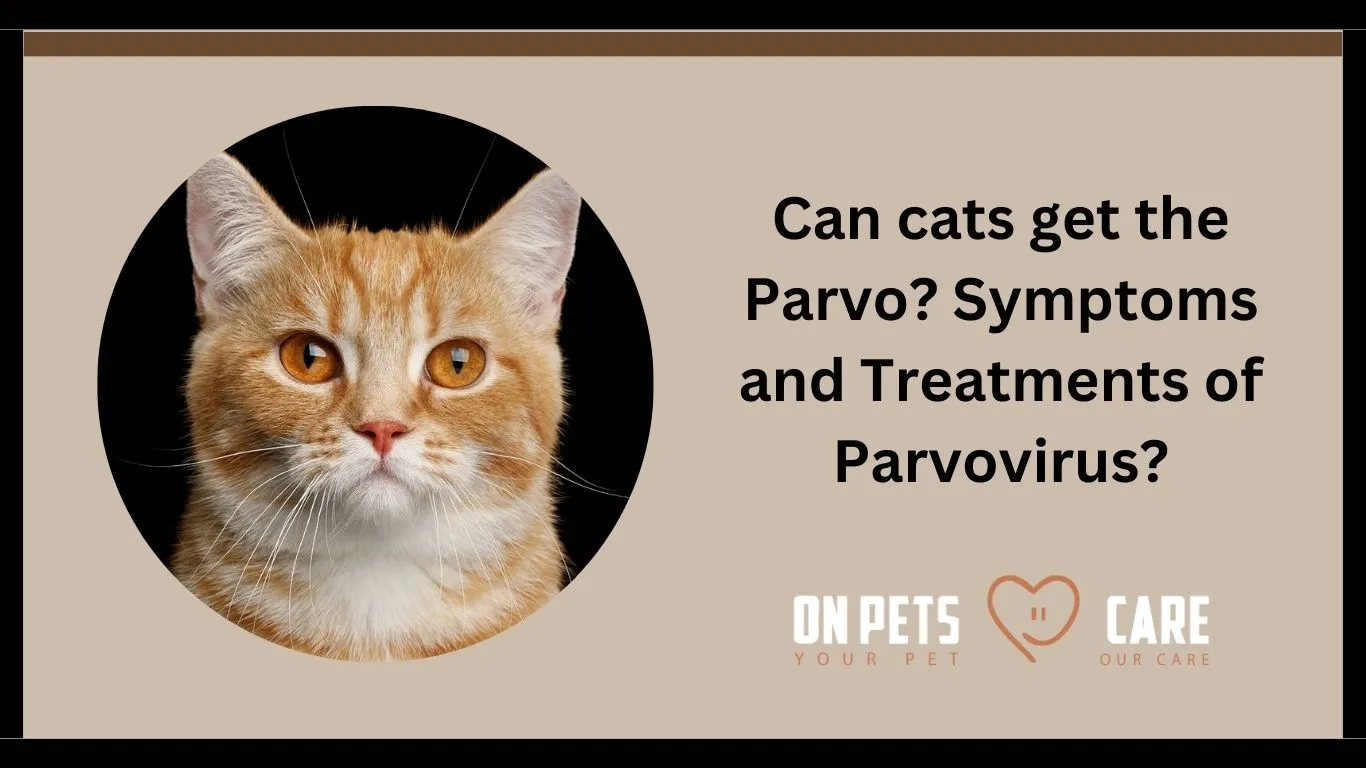Can cats get the Parvo? Possible Symptoms and Treatments of Parvovirus?
Today, we’re going to provide expert insights on the burning question for cat parents: Can cats get the parvo? We’ll explore the ins and outs of this viral disease, discussing its varieties, reasons why cats might fall victim, the diagnostic process, the possibility of a second attack, and, of course, the symptoms and treatments that every cat parent should be aware of.
Table of Contents
Understanding Parvovirus
Parvovirus is a highly contagious and potentially deadly virus that comes in various forms. These include the infamous canine parvovirus (CPV) and feline panleukopenia virus (FPV). These nasty bugs wreak havoc on a cat’s immune system, causing a range of issues from gastrointestinal problems to severe dehydration.
Parvovirus, specifically the Feline Panleukopenia Virus (FPV), is a highly contagious and potentially severe viral infection that affects cats. Understanding how the parvovirus attacks cats and the nature of this virus is crucial for cat owners to recognize and address the threat effectively.
Nature of Parvovirus
The nature of the parvovirus explains the answer to the question of whether cats can get parvo. Parvovirus is a resilient and hardy virus belonging to the Parvoviridae family. FPV is the specific variant that affects cats, and it can survive in the environment for an extended period, resisting common disinfectants. This makes it a persistent threat, particularly in places with a high concentration of cats, such as shelters, catteries, or multi-cat households.
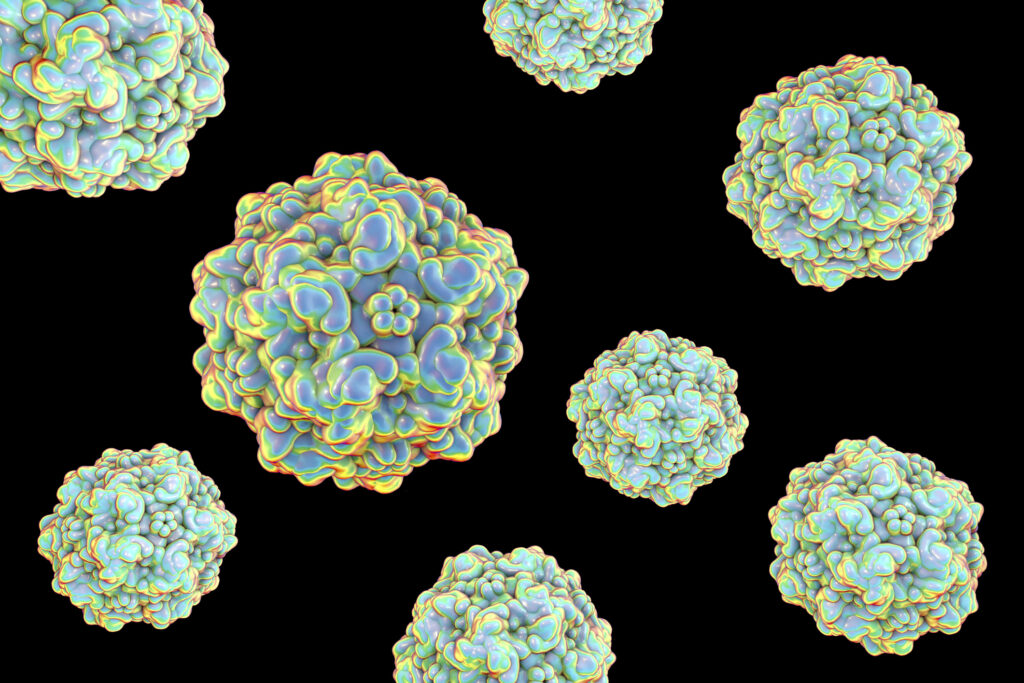
Mode of Transmission
The virus primarily spreads through direct contact with an infected cat or its bodily fluids. It can also be transmitted indirectly through contaminated objects like Food bowls, bedding, and litter boxes. Kittens are especially vulnerable, as they can contract the virus from their infected mother.
Attack on the Immune System
Once the virus enters a cat’s body, it targets rapidly dividing cells, with a particular affinity for the bone marrow, intestines, and lymphoid tissues. FPV attacks and destroys white blood cells, leading to a severe drop in the cat’s immune defenses. This compromised immune system opens the door to secondary infections, making the overall condition of the cat even more critical.
Can cats get the Parvo & its Impact on Kittens?
Kittens are particularly susceptible to parvovirus due to their developing immune systems. A parvovirus attack on kittens can lead to devastating consequences, including death. Pregnant cats infected with FPV may also experience reproductive failure, leading to stillbirths or birth defects in kittens.
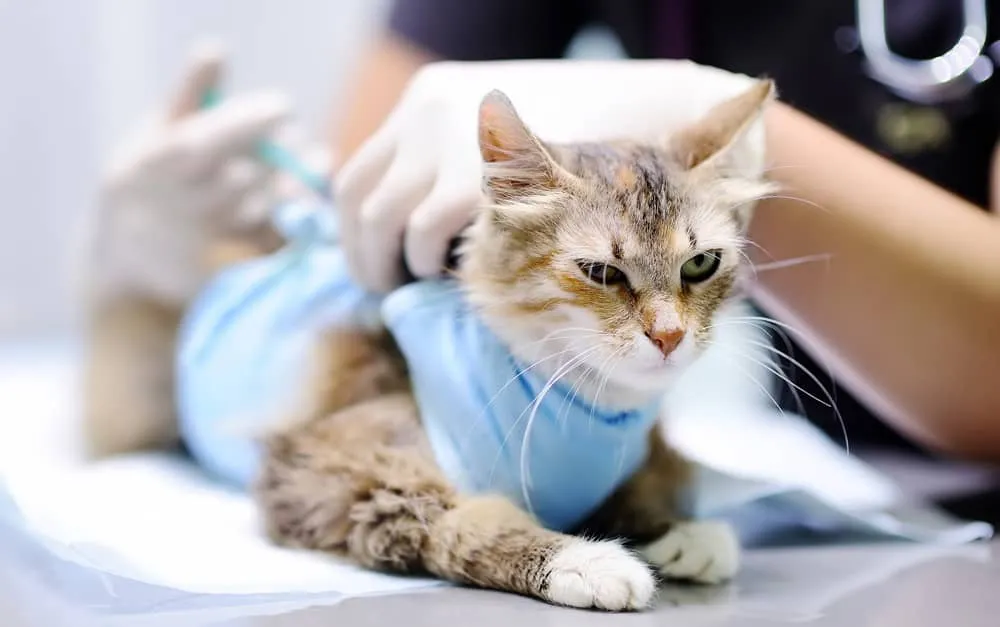
Can Cats Get the Parvo?
Now, onto the pressing question – can cats get parvo? Unfortunately, yes. Cats can indeed fall prey to the parvovirus, and there are a few reasons why this might happen.
- Lack of Vaccination: Cats that haven’t received vaccinations are more susceptible to parvovirus. It’s like leaving the front door wide open for trouble.
- Weakened Immune System: A weakened immune system is an open invitation for parvovirus. Stress, malnutrition, or other illnesses can compromise a cat’s defenses.
- Environmental Factors: Parvovirus is a hardy bug. It can linger in the environment for months, waiting for the right moment to strike. Poor sanitation in catteries or shelters can expose cats to the virus.
How Does Parvovirus Attack?
Picture this: parvovirus silently infiltrates a cat’s system. But under what conditions does this ninja attack?
Stressful Situations
Cats experiencing stress, whether due to a change in environment or the introduction of a new pet, are more susceptible to parvovirus.
Kittens and Young Cats
The immune system of kittens and young cats is still on training wheels. Parvovirus sees this vulnerability as an opportunity for an attack.
Diagnosing Parvovirus
So, how do you know if your feline friend has fallen victim to the notorious parvovirus? The diagnostic process involves a comprehensive approach:
Clinical Signs
Watch for potential indicators of a parvovirus infection by paying attention to clinical signs. Signs such as lethargy, vomiting, diarrhea, and a loss of appetite could be red flags. Think of these signs as early warning signals, prompting you to investigate further if your cat displays any unusual behavior. It’s akin to noticing peculiar marks on a map, guiding you to potential trouble spots that warrant closer scrutiny.
Blood Tests
Blood tests play a crucial role in unraveling the mystery of a potential parvovirus infection. These tests are a detective’s magnifying glass, revealing insights into your cat’s internal landscape. Specifically, a blood test can uncover a decrease in white blood cell count – a commonly observed sign indicative of parvovirus infection. This diagnostic approach is like decoding a cryptic message, providing veterinarians with essential information to formulate an accurate diagnosis and guide subsequent treatment decisions.
PCR Testing
Enter PCR testing, a sophisticated method that takes the diagnostic process to the molecular level. Polymerase chain reaction (PCR) testing acts as a genetic detective, honing in on the presence of parvovirus DNA within your cat’s biological material. This method goes beyond conventional testing, offering a meticulous examination that confirms the specific genetic makeup of the virus. Think of PCR testing as a precision tool, enabling veterinarians to definitively identify the culprit and tailor treatment strategies accordingly. It’s akin to pinpointing the exact identity of a suspect through advanced forensic analysis
Can cats get the Parvo Twice?
Now, the million-dollar question – can cats get parvo twice? The good news is that surviving an initial bout with parvovirus often provides immunity. However, there are rare cases of reinfection, so it’s crucial to stay vigilant.
Symptoms of Parvovirus in Cats
Recognizing the symptoms is key to timely intervention:
- Lethargy: Cats infected with the parvovirus often exhibit a noticeable lack of energy and interest in their usual activities.
- Vomiting: Persistent vomiting is a classic symptom of parvovirus infection, leading to dehydration and weakness.
- Diarrhea: Diarrhea, sometimes severe and accompanied by a foul odor, is a common gastrointestinal sign of parvovirus.
- Loss of Appetite: Cats infected with parvovirus may experience a sudden and significant decrease in their appetite, refusing to eat their regular meals.
- Dehydration: Due to vomiting and diarrhea, cats with parvovirus are at risk of becoming dehydrated, which can exacerbate their overall condition.
- Fever: An elevated body temperature is a typical response to the parvovirus, indicating the cat’s immune system is actively fighting the infection.
- Depression: Infected cats may display signs of depression, appearing withdrawn, uninterested, and generally less interactive than usual.
- Weight Loss: Unexplained weight loss can occur as a result of reduced food intake and the impact of the virus on the cat’s overall health.
- Abdominal Pain: Cats with parvovirus may exhibit signs of abdominal discomfort or pain, often manifested through a hunched posture or reluctance to be touched around the belly.
- Respiratory Distress: In severe cases, respiratory symptoms such as difficulty breathing or coughing may be observed, indicating the virus has taken a toll on the cat’s respiratory system.
Treatments to Avoid Parvo Virus Attack
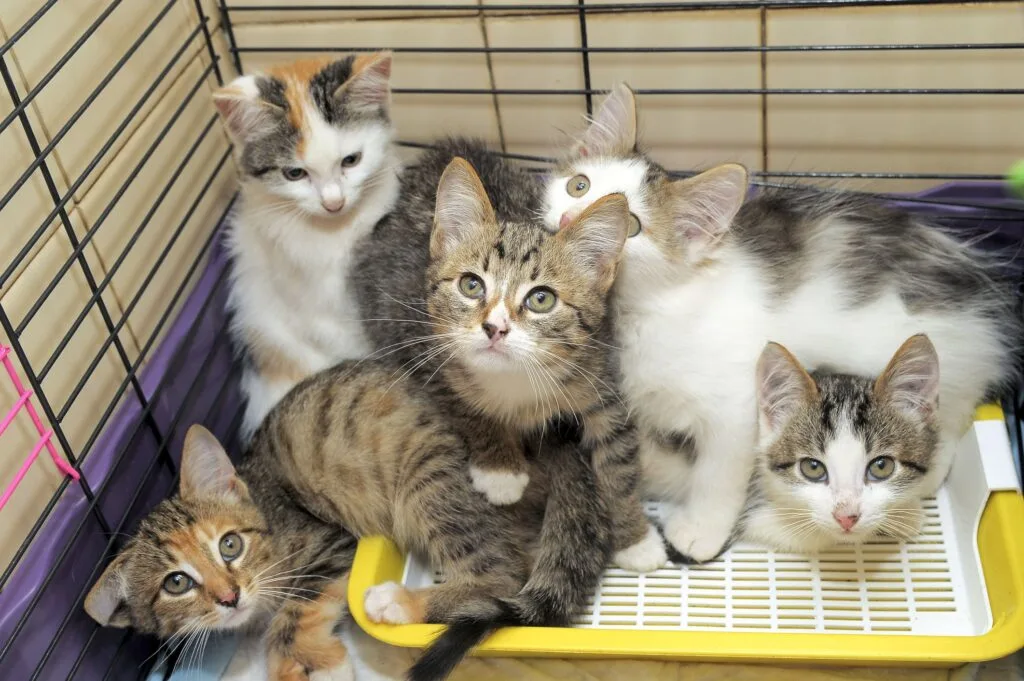
Prevention is the name of the game. Here’s how you can safeguard your cat:
Vaccination
Vaccination is the first line of defense against parvovirus. Regular vaccinations, starting in kittenhood for cats and Puppies for dogs, significantly reduce the risk of infection. Boosters are crucial to maintaining immunity. Consult your veterinarian for a tailored vaccination schedule based on your pet’s lifestyle.
| Vaccine Name | Protection Against FPV | Additional Protection | Duration of Immunity | Boosters Recommended |
|---|---|---|---|---|
| Purevax RCP | Yes | Rhinotracheitis, Calicivirus | 3 years | Every 3 years |
| ProPet RCP | Yes | Rhinotracheitis, Calicivirus | 3 years | Every 3 years |
| Nobivac Four-in-One | Yes | Rhinotracheitis, Calicivirus, Chlamydophila felis | 3 years | Every 3 years |
| Purevax Feline DA2PPcV | Yes | Distemper, Adenovirus | 3 years | Every 3 years |
| ProPet Feline DA2PPcV | Yes | Distemper, Adenovirus | 3 years | Every 3 years |
| Nobivac KC | Yes | Feline leukemia virus | 1 year | Yearly |
Hydration
Adequate hydration is critical in managing parvovirus cases, especially due to the severe vomiting and diarrhea it induces. Intravenous (IV) fluids administered by a veterinarian help prevent dehydration and maintain electrolyte balance. Oral rehydration solutions may also be recommended for at-home care, ensuring your pet stays hydrated during recovery.
Isolation and Cleanliness
Isolating the infected pet is vital to prevent the spread of parvovirus to other animals. Create a dedicated recovery space with minimal contact with Healthy pets. Thorough cleanliness is essential—regularly disinfect bowls, bedding, and the environment using a bleach solution to neutralize the virus.
Medication for Symptoms
Medications may be prescribed to manage specific symptoms. Antiemetics help control vomiting, while antidiarrheals can alleviate diarrhea. Gastrointestinal protectants may be administered to soothe and protect the digestive tract. Consult your veterinarian before administering any over-the-counter medications.
Nutritional Support
Proper Nutrition supports the weakened immune system. Veterinarians may recommend a bland diet, easily digestible, and rich in nutrients. In severe cases, a feeding tube may be necessary to ensure adequate nutrition during recovery.
Antibiotics
Secondary bacterial infections can arise due to the compromised immune system. Antibiotics may be prescribed to address these infections, enhancing the overall treatment plan.
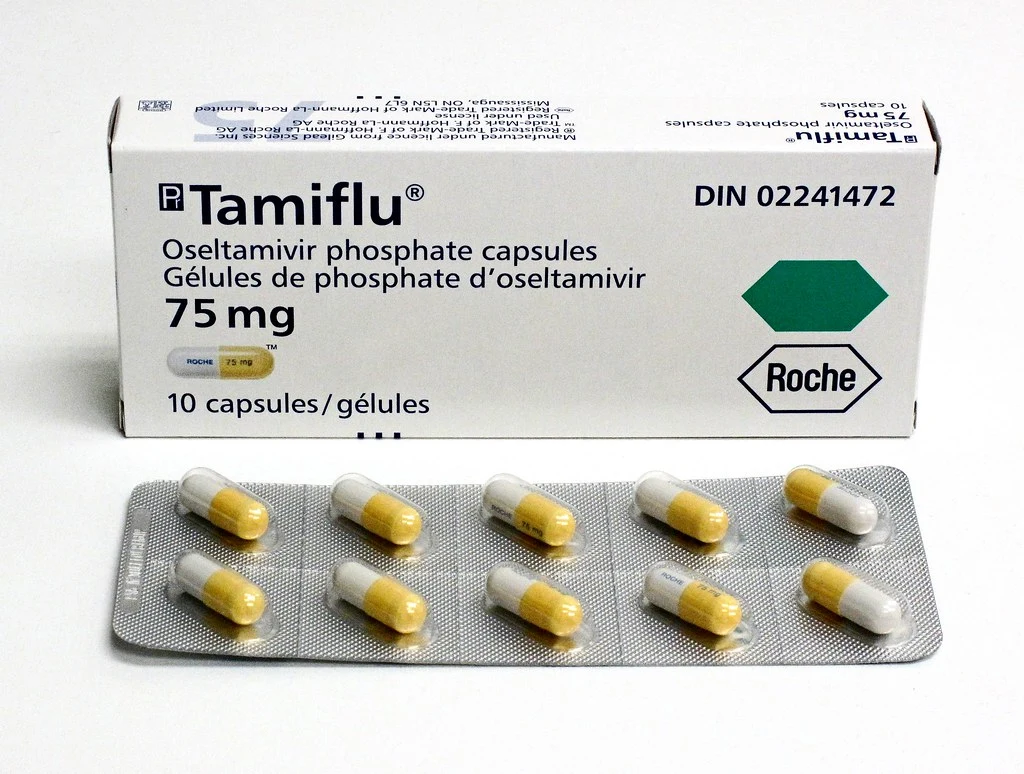
Anti-inflammatory Medications
To reduce inflammation and discomfort, veterinarians may administer anti-inflammatory medications. These can help manage pain and improve the pet’s overall well-being.
Monitoring and Follow-Up Care
Regular monitoring by a veterinarian is crucial during and after treatment. Follow-up appointments ensure the pet is responding positively to the treatment plan. Adjustments may be made based on the pet’s progress and any emerging complications.
Conclusion
Now that you’re armed with information on whether cats can get parvo, the symptoms to watch for, and the treatments available, you can be the superhero your feline friend needs. Remember, a little prevention goes a long way in keeping your cat happy, healthy, and parvo-free. Onpets Care – because every cat deserves a perfect life!
FAQs
1. Can cats get parvo?
Yes, cats can definitely get parvovirus, though it’s a different strain than the one affecting dogs (canine parvovirus). Their specific strain is called Feline Panleukopenia Virus (FPV). While uncommon in well-vaccinated cats, unvaccinated or immunocompromised felines are at higher risk.
2. How do cats get parvovirus?
FPV primarily spreads through direct contact with an infected cat or their bodily fluids like vomit or feces. Indirect transmission is also possible through contaminated objects like food bowls, bedding, or litter boxes. Kittens can even contract it from their mother during pregnancy or birth.
3. What are the symptoms of parvovirus in cats?
Watch for lethargy, loss of appetite, vomiting, diarrhea (often bloody), fever, dehydration, abdominal pain, and weight loss. These symptoms can worsen quickly, so prompt veterinary care is crucial.
4. How is parvovirus in cats treated?
Treatment focuses on supportive care, addressing dehydration, managing secondary infections, and easing discomfort. This may involve intravenous fluids, anti-vomiting and anti-diarrheal medications, antibiotics, and nutritional support. Depending on the severity, hospitalization might be necessary.
5. Can cats get parvovirus twice?
Although rare, reinfection with FPV is possible, especially in cats with weakened immune systems. Therefore, maintaining regular vaccinations and practicing good hygiene even after recovery is essential.

